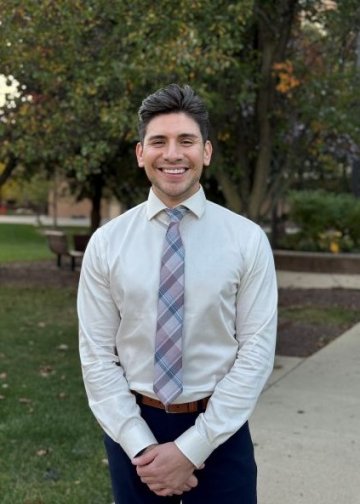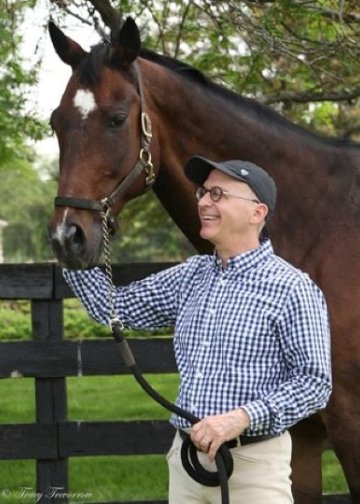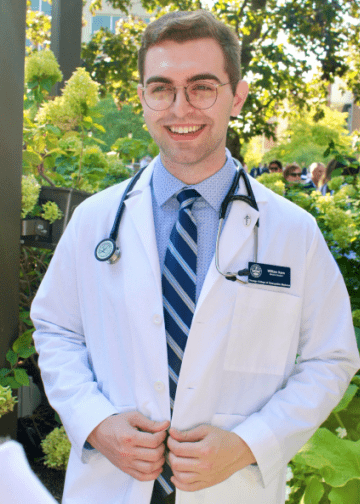
"I’m known for my stories. When I tell a story, it’s clinically based on what we’re discussing in class. My experience and background are a little different than most dentists. I was never in a single facility. I’ve had experiences all over the world."
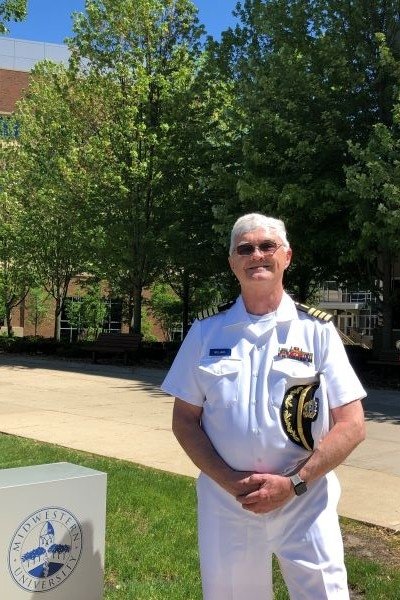
Years at Midwestern University:
11 years. I started in 2012, and I was promoted to Professor last year.
What are your research interests?
- Medical Emergencies in the Dental Office
- Hands-on Simulation of Medical Emergencies in Dental School Curriculum
- Tobacco, Vaping, and Cannabis
- Recognizing Depression in Dental Patients
- Recognizing Cognitive Issues in Dental Patients
- Recognizing Anxiety in Dental Patients
- Dentist Knowledge of Human Trafficking
- The presence of nodal as an indicator of oral cancer
What is the most rewarding part of being a member of the Midwestern University faculty?
Staying young. It keeps me on my toes. I have to be aware of the resources the students have, what they find versus what we teach. They can Google everything. I refer them to the textbook, my lecture materials, or an evidence-based research paper. I help show them how to read between the lines.
How do you engage students in the learning process?
I’m known for my stories. When I tell a story, it’s clinically based on what we’re discussing in class. My experience and background are a little different than most dentists. I was never in a single facility. I’ve had experiences all over the world with military dentistry. I’ve worked closely with medical personnel in the hospital. I taught public health medicine residents, internal medicine residents, and EMT, GPR (General Practice), AEGD (Advanced Education in General Dentistry) residents. I went through triage training, where patients are separated based on their level of urgency (minimal, delayed, immediate, expectant). I was also in charge of a battle dressing station (area where surgical procedures are conducted). I traveled to different hospitals. I worked with the community, where our military families had to go for care. I was in leadership for the Navy and Marine Corps in Public Health and Wellness and the Department of Defense, Public Health Emergency Officer, and served 16 states. I worked with wounded warriors with multiple injuries, brain injuries, and PTSD, and I trained a staff to address those needs.
What do you hope students learn from your classes?
Evidence-based, best practices, and common sense. If you get those corners, you’re going to be good. Here at Midwestern University, the classes are for general dentists. You have to carry with you what’s going to be best for the patient, your staff, and yourself. Make sense of what’s going on in the world, and how it applies to general dentistry.
Why should students enroll at Midwestern University?
Because it’s the absolute best place to go. We have a very diverse group of professors, instructors, student population, and curriculum. There is plenty of support and plenty to do. You get the education, the experience, and you get to handle the equipment for specialty areas.
What lessons would you like students to take with them in their professional careers?
Never be afraid to ask for help. Continuing your education is important. The knowledge you learned yesterday may well have changed tomorrow. Always assume it changes and keep up with it. I still have students that reach back out to me. We’ll meet up and develop a treatment plan, especially for something unusual. I am always glad to do that.
What about your profession should people know more about?
How hard it is, how much we do, but also the rewards. Anything worth doing is worth doing right. Be prepared to give 100 percent. The rewarding aspect of the profession is helping the students, other faculty, patients, community areas, and others.
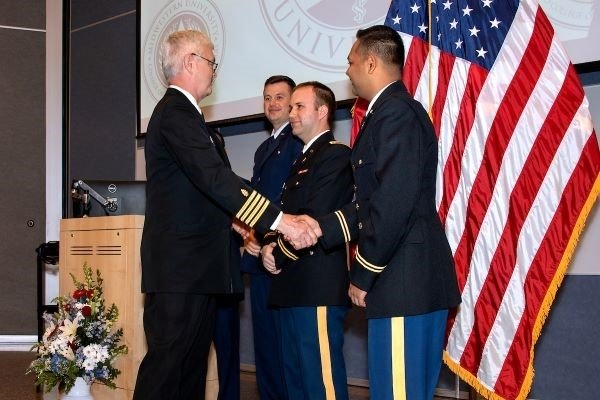
Military Service Questions:
What branch do you serve in and what is your rank?
I served in the U.S. Navy Dental Corps. I retired as a Navy Captain. I served for 30 years.
Why did you choose to serve, and how did that influence your journey into healthcare?
I was always intrigued as a young person to serve in the military. Our library was as big as the Commons cafeteria food service area. I read every military book, particularly every book about the Navy, some documentaries, Pacific battles, World War I and II battles, and a book about one of the dentists who received the Navy Medal of Honor, Dr. Weedon Osbourne.
My mother was also a nurse, and I would help her. There were patients with catheters and diabetes. She was checking them for ulcers and their feet turning black. I knew I wanted to be in healthcare. I also wanted to be a pilot. I applied to flight training for the Navy and dental school at the same time. My mom was waiting on the porch when the acceptance letters came in. She already opened them and said, ‘You’re going to dental school.’ I joined the Navy as soon as I started dental school in 1978.
I came on active duty full-time as soon as I graduated in 1982. My duties in the military were basically in four areas: leadership, Navy and Marine Corps, public health and wellness, and the Department of Defense. I worked on aircraft carriers and other submarines. I went to help train people to get cigarette smoking removed. It harms everybody’s lungs. I worked in the Navy facilities, such as dental clinics and hospitals. I provided training in different places around the world including Korea, Germany, Italy, and Spain during my position in health and wellness.
I was on board an aircraft carrier, and we were in a situation of mock training for a medical disaster. Someone from the flight deck came to our training area and said, “Dr. Williams, we need you on the flight deck immediately. An external fuel tank was not positioned properly, and it fell, ruptured, and covered the sailors head to toe with jet fuel. We got them into the shower and poured shampoo over the top of them. We called the hospital area, and they sent people up to escort them down to the major hospital area. The patients were stabilized until they could be treated. We did so much in such a short time, and we had never trained for a chemical spill.
How does Midwestern University support active service members and veterans?
Midwestern University supports veterans very nicely. They are always thanking us for our service. There are scholarships, active service members and veterans can do their training and come back here and do their work. It’s been a wonderful synergy of current military service and previous military service.

